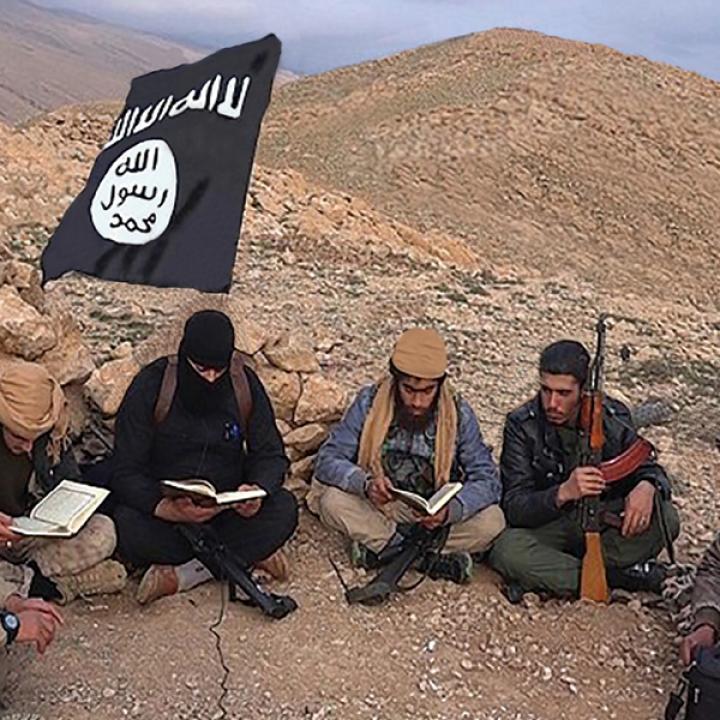
- Policy Analysis
- Policy Focus 155
Neither Remaining Nor Expanding: The Decline of the Islamic State

Part of a series: Counterterrorism Lecture Series
or see Part 1: U.S. Efforts against Terrorism Financing: A View from the Private Sector
The eighth volume in the Institute's Counterterrorism Lecture Series features expert briefings by officials, business leaders, and CT practitioners from 2016 and 2017.
In step with the progression of the coalition war against the Islamic State over the course of 2016, the threat of IS-directed attacks in the West continued to trend upward, posing significant challenges for social media companies, law enforcement, intelligence agencies, and local communities alike.
Edited by Matthew Levitt, this eighth volume in the Institute's Counterterrorism Lectures Series spans the period from February 2016 to November 2017, offering a snapshot of how officials, experts, and CT practitioners addressed some of the most pressing challenges at the height of the battle against IS and the beginning of its decline.
This volume includes lectures by the following experts; the positions were current at the time of presentation:
- Ali Mohsen al-Alaq, governor, Central Bank of Iraq
- Shanna Batten, director, Community Resilience Initiatives Program, Center for Health and Homeland Security, University of Maryland
- Rand Beers, deputy assistant to the president for Homeland Security, Obama administration
- Monika Bickert, head of global policy management, Facebook
- William Brannif, executive director, National Consortium for the Study of Terrorism and Responses to Terrorism
- Lord Richard Dannatt, chief of the general staff, British Army; commander of British forces, Afghanistan; advisor to David Cameron
- Olivier Decottignies, TWI diplomat in residence; second counselor, French Embassy, Iran
- Muhammad Fraser-Rahim, executive director, North America, Quilliam International
- Bruce Hoffman, director, Center for Security Studies, Georgetown University
- Boaz Ganor, dean and Ronald Lauder Chair for Counter-Terrorism, Lauder School of Government, Diplomacy and Strategy, IDC, Herzliya, Israel
- Daniel L. Glaser, assistant secretary for terrorist financing, Office of Terrorism and Financial Intelligence, Treasury Department
- Seamus Hughes, deputy director, Program on Extremism, George Washington University
- James F. Jeffrey, Philip Solondz Distinguished Fellow, TWI; former ambassador to Iraq, Turkey, and Albania
- Richard Kemp, senior associate fellow, Royal United Services Institute; commander, British forces, Afghanistan; head, international terrorism team, UK Joint Intelligence Committee
- Gilles de Kerchove, counterterrorism coordinator, European Union
- Naomi Kikoler, deputy director, Simon-Skjodt Center for the Prevention of Genocide, U.S. Holocaust Memorial Museum
- Matthew Levitt, Fromer-Wexler fellow and director, Stein Program on Counterterrorism and Intelligence (now the Reinhard Program on Counterterrorism and Intelligence), TWI
- Marlene Mazel, TWI adjunct scholar; director, Counter-Terrorism Litigation Division, Israeli Ministry of Justice
- Klaus Naumann, former chief of staff, German Bundeswehr; chairman, NATO Military Committee
- Farah Pandith, adjunct senior fellow, Council on Foreign Relations; senior fellow, Belfer Center for Science and International Affairs, Harvard University
- Samantha Ravich, deputy national security advisor for Vice President Cheney
- Eric Rosand, director, The Prevention Project: Organizing Against Violent Extremism, Global Center on Cooperative Security
- Dick Schoof, national coordinator for security and counterterrorism, Netherlands
- Michael Steinbach, executive assistant director, National Security Branch, FBI







